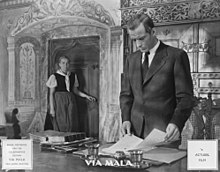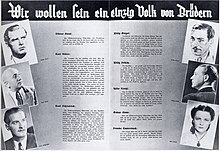Viktor Staal
Viktor Staal (born February 17, 1909 in Frankstadt , Moravia , Austria-Hungary as Rudolf Viktor Stiaßny , † June 4, 1982 in Munich ) was an Austrian actor .
Live and act
Viktor Staal was the son of a copper boiler manufacturer and first attended business school to become an engineer. Against his father's wishes, he broke off his training to take acting classes in Vienna . He made his stage debut at the Stadttheater Troppau , after which he was engaged in Ostrau , Gablonz , Reichenberg and at the Vienna Volkstheater .
Viktor Staal came to film in 1935 with a small supporting role in a film by the Wiener Mondial Internationale Filmindustrie AG in which Gustav Fröhlich and Adele Sandrock played the main roles. In 1936, through a German-Austrian co-production by Ondra-Lamac-Film GmbH, Staal first met with Ufa in Berlin , which hired him in the same year for his first leading role in Reinhold Schünzel's adventure film “Donogoo Tonka”. Further leading roles followed in the films "Waldwinter", "Brillanten" and "Ritt in die Freiheit", in which Staal always played together with Hansi Knoteck . In 1937 he stood in front of the camera for the first time with Zarah Leander for Detlef Sierck's love drama “To New Shores” . This was followed by leading roles in the films " Capriccio ", "Thunderstorm in May", " One Night in May ", " Women for Golden Hill ", "Suspicion of Ursula", "The Right to Love", "Detours to Happiness", " Twilight ”,“ Love School ”and“ Homeland ”.
In Mein Film in Wien, the Illustrierte Film- und Kinorundschau, of April 15, 1938, Staal and some of his fellow actors made a statement under the title We want to be one people of brothers happy about the reunification of Austria with the Reich . In 1941/42 Viktor Staal, who had been married to his colleague Hansi Knoteck since 1940, shot one of the most commercially successful films in Nazi cinema together with Zarah Leander : Rolf Hansen's Schnulze about love and the duty of a soldier, which repeatedly forces you to renounce this love: " The great love ". Until the end of the Second World War , Staal could still be seen in the following films: “I love me”, “You belong to me”, “ The wife ”, “Nora” and “ The strange life ”. The film “Via Mala” was only released in German cinemas in 1948 due to a ban by the film inspection agency, and the film “ I believe in you ” was only finished after the end of the war.
After the end of the Second World War , Viktor Staal initially worked at the Berlin Theater on Schiffbauerdamm , but soon returned to film. Because in the time of National Socialism , although in propaganda films , but in no particularly notorious had participated propaganda film and its type - the wooden something, but nice and handsome lover and husband reliable, moreover - was still in demand, Staal one of those German movie stars, who could easily continue their career after the war. He found his first post-war role in Harald Braun's rubble film "Between Yesterday and Tomorrow" (with Viktor de Kowa and Winnie Markus ). Up until 1977 Viktor Staal took part in 39 other films, although he outgrew the amateur subject more and more over the years. He found bigger roles in the films “Your Heart is My Home” (1955) and the Karl May film “ Die Sklavenkarawane ” (1958). In the 1960s he also worked repeatedly for television, e.g. B. in the well-known series “ Country Doctor Dr. Brock ”.
His grave is in the cemetery in Gauting near Munich . The tombstone was moved to the grave site of his wife Hansi Knoteck, who died on February 23, 2014 in Eggstätt , in Munich's North Cemetery .
Filmography
- 1935: Lieutenant Bobby, the devil guy (Director: Georg Jacoby )
- 1935: A waltz around St. Stephen's Cathedral (Director: Johann Alexander Hübler-Kahla )
- 1935: The basics of love (Direction: Carl Hoffmann )
- 1935: Everything for the company (Director: Rudolf Meinert )
- 1935: Eva
- 1935: The whole world revolves around love (Director: Viktor Tourjansky )
- 1936: A girl from the ballet (director: Karel Lamač )
- 1936: Donogoo Tonka
- 1936: Forest winter (Direction: Fritz Peter Buch )
- 1936: Diamonds (Direction: Eduard von Borsody )
- 1936: Riding to freedom
- 1937: To new shores
- 1938: Capriccio
- 1938: Thunderstorm in May (Director: Hans Deppe )
- 1938: To be continued (Director: Paul Martin )
- 1938: One Night in May (Director: Georg Jacoby )
- 1938: Women for Golden Hill (Director: Erich Waschneck )
- 1939: Suspicion of Ursula
- 1939: The Right to Love (Director: Joe Stöckel )
- 1939: Detours to happiness (Director: Fritz Peter Buch )
- 1940: love school
- 1941: home earth
- 1941: Twilight
- 1941: Weather lights around Barbara
- 1942: great love
- 1942: love me!
- 1942: You belong to me
- 1943: The wife
- 1944: Nora
- 1944: The strange life
- 1944: My heart belongs to you / Mathilde Möhring (first performance: 1950)
- 1945: Via Mala
- 1947: between yesterday and tomorrow
- 1949: Seduced hands
- 1949: marriage tables
- 1949: The strange story of Kaspar from Brandner
- 1949: You Are No More (Documentary)
- 1950: Everything for the company
- 1950: Riots in Paradise
- 1951: A woman with a heart
- 1951: The strange life
- 1951: What the heart commands
- 1951: the last shot
- 1951: Under the spell of the Madonna
- 1952: House of Life
- 1952: The exchange of women
- 1952: When the heather dreams in the evening
- 1953: The adjourned wedding night
- 1953: Aunt Jutta from Calcutta
- 1953: Your heart is my home
- 1954: impostor of love
- 1954: In the beginning it was sin
- 1955: Regine
- 1955: The smith of St. Bartholomae
- 1955: The dark star
- 1955: Closed roads (Camino cortado)
- 1955: The mistress of the Sölderhof
- 1956: Spy for Germany
- 1957: blue boys
- 1957: The Fox of Paris
- 1957: Weather lights around Maria
- 1958: Taiga
- 1958: The black lightning
- 1958: The slave caravan
- 1959: Hubertus hunt
- 1962: Wild Waters
- 1962: The pastor with the jazz trumpet
- 1963: Interpol: Hearts Are Trumps (TV series)
- 1964: The three hypocrites
- 1964: Freddy, animals, sensations
- 1967, 1968: Country doctor Dr. Brock (TV series, 5 episodes)
- 1969: Help, I love twins!
- 1974: The Hunter of Fall
- 1977: The standard
literature
- Brigitte Bruns: Staal, Viktor Rudolf. In: New German Biography (NDB). Volume 24, Duncker & Humblot, Berlin 2010, ISBN 978-3-428-11205-0 , pp. 775 f. ( Digitized version ).
- Viktor Staal , in: Internationales Biographisches Archiv 41/1982 of October 4, 1982, in the Munzinger archive ( beginning of article freely available)
Web links
- Viktor Staal in the Internet Movie Database (English)
- Photo, short biography ( memento from May 9, 2009 in the Internet Archive ) on film-zeit.de
- Viktor Staal at filmportal.de
| personal data | |
|---|---|
| SURNAME | Staal, Viktor |
| ALTERNATIVE NAMES | Stiaßny, Rudolf Viktor |
| BRIEF DESCRIPTION | Austrian actor |
| DATE OF BIRTH | February 17, 1909 |
| PLACE OF BIRTH | Frankstadt , Moravia , Austria-Hungary |
| DATE OF DEATH | 4th June 1982 |
| Place of death | Munich |



